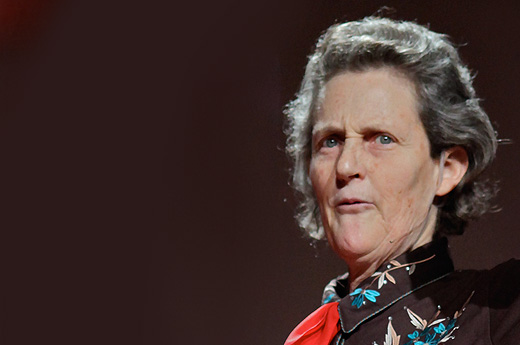 Photo: (cc) Steve Jurvetson/Flickr
Photo: (cc) Steve Jurvetson/Flickr
I recently had the great pleasure of hearing Temple Grandin speak at the Ecofarm conference in California. She is renowned for transforming the animal slaughter process to be more humane. For example, before she helped McDonald’s Corp transform its slaughtering techniques, only 30 percent of the animals were being killed on the first attempt. Today, it’s more than 90 percent.
Temple is also autistic, so she brings a very unique perspective to her work. And while she’s a hoot to listen to, there is no mistaking her determination to bring positive changes to the world. Her deep concern and understanding of animals and even humans is not only easy to see, but contagious as well.
So here are five things I got from Temple Grandin that can greatly benefit us all:
- Most of all, we need to learn how to observe and to see. The observation of visual detail is critical to understanding anything; too often we think rather than see. When you observe openly and closely, so many things become obvious. We can also learn to see the way animals see. Their thinking, she says, is very, very specific because they think in pictures. Removing visual stressors from their environment is key to reducing stress. This, I believe, is why many people like a clean and tidy home!
- Animals have feelings and emotions. Evidence of this abounds, not in agriculture schools or farm education, but in neuroscience. Anybody who loves a pet knows this instinctively, but it’s also been documented. I loved how Temple describes the “seeking” emotion. For example, she calls it the paradox of novelty—when something new is both fearful and attractive, an animal has the desire to seek and approach it, even though the creature might also be afraid. I feel that all the time!
- Management takes effort. You could almost taste her frustration about installing a new system somewhere and coming back a year later to find it not working. She’s found that it all depends on good management. Whether it’s a huge or a small farm, the difference between good and bad isn’t size, but the quality of the management. And she believes strongly that objective measurements are key. Forget words like “proper” and “relevant” that can’t be measured; think numbers and behaviors.
- There is no substitute for practical experience. She got a huge round of applause when she said that the problem with policy makers today is that they have no practical experience; to them, it’s all an abstraction. She also described taking executives of fast-food companies to slaughterhouses and how quickly that got them changing things. It’s one thing to think you know it; it’s another altogether to observe it and truly understand it. That’s why we have to be careful talking about things we have no personal experience with.
- Be a silo buster. “I’ve been a silo buster all my life,” she said. When you stay within your narrow comfort zone of expertise, you miss almost everything. It’s really when you take a systemic, holistic view of things that you can begin to see a full picture of things. She mentioned Google Scholar a lot as a source of information for finding data that crosses boundaries.
When I stood in line to have her sign her new book, The Autistic Brain, I told her I’ve been a silo buster my whole life, too. But it’s hard. It’s frustrating. I could feel it. When you’re a silo buster, you don’t quite fit in anywhere. Perhaps that’s why there aren’t more of us.




Maybe it would feel better – being a silo buster – if you renamed yourself: Silo Busters are really Free Spirits!
Thank God for Free Spirits everywhere….